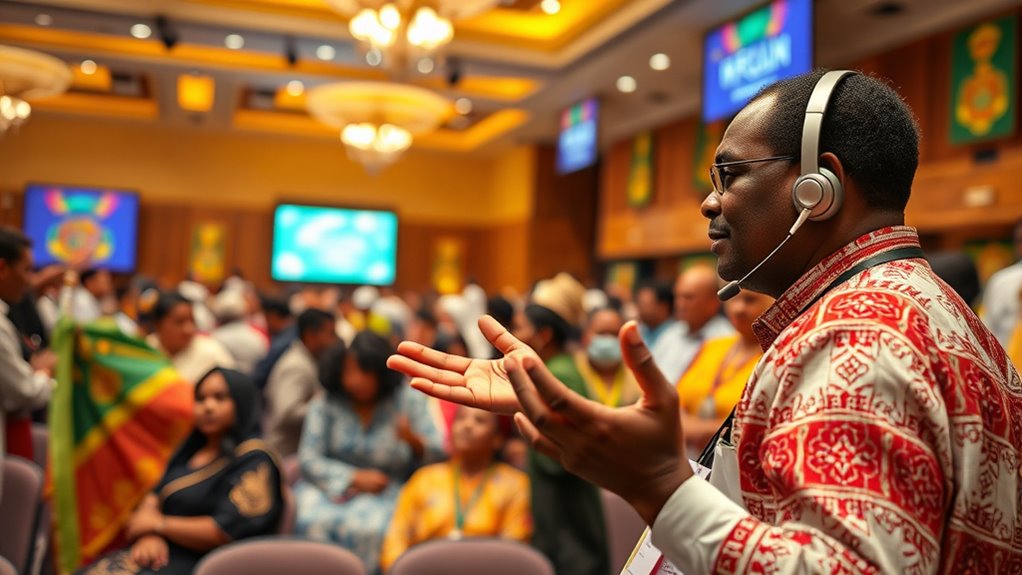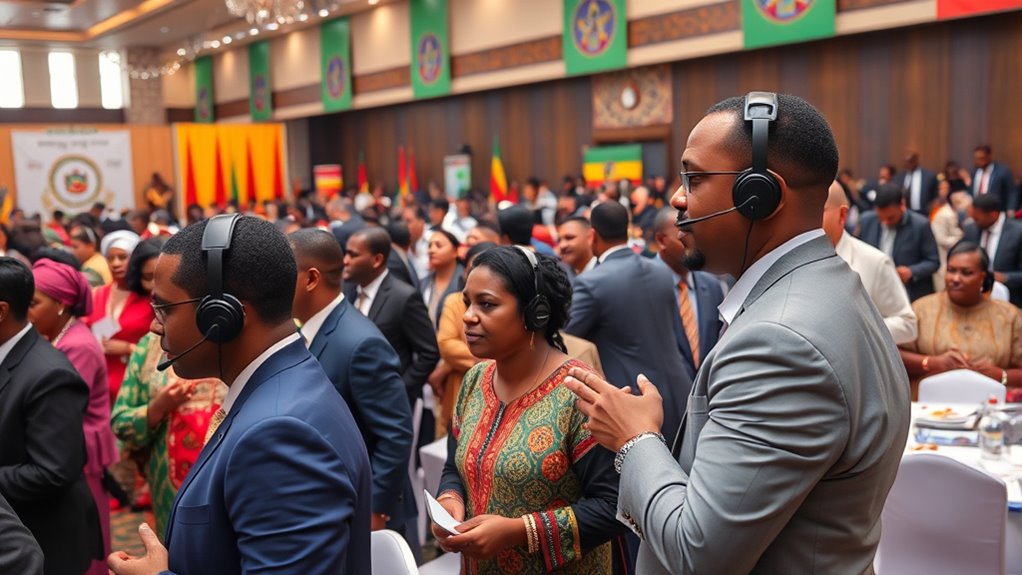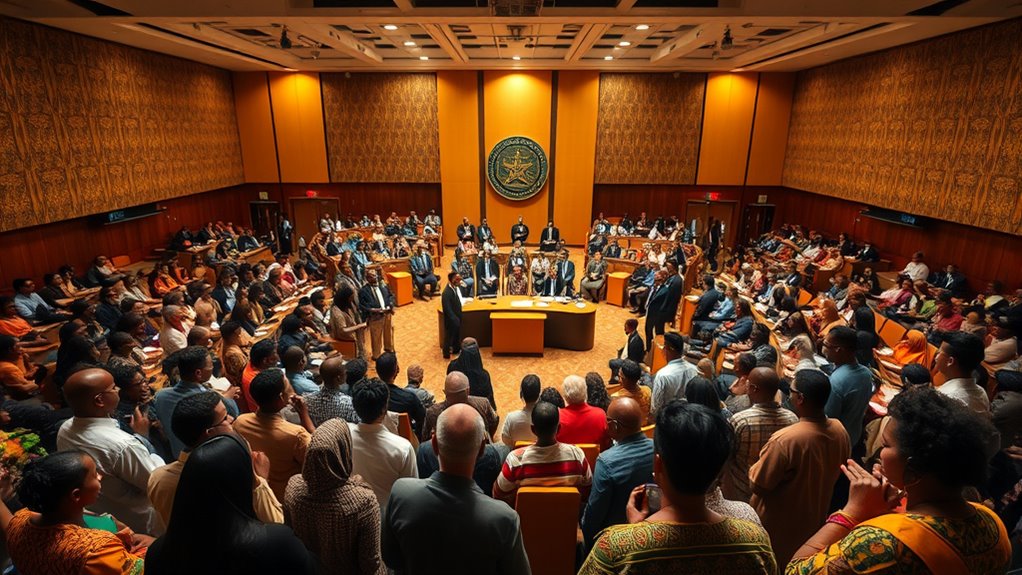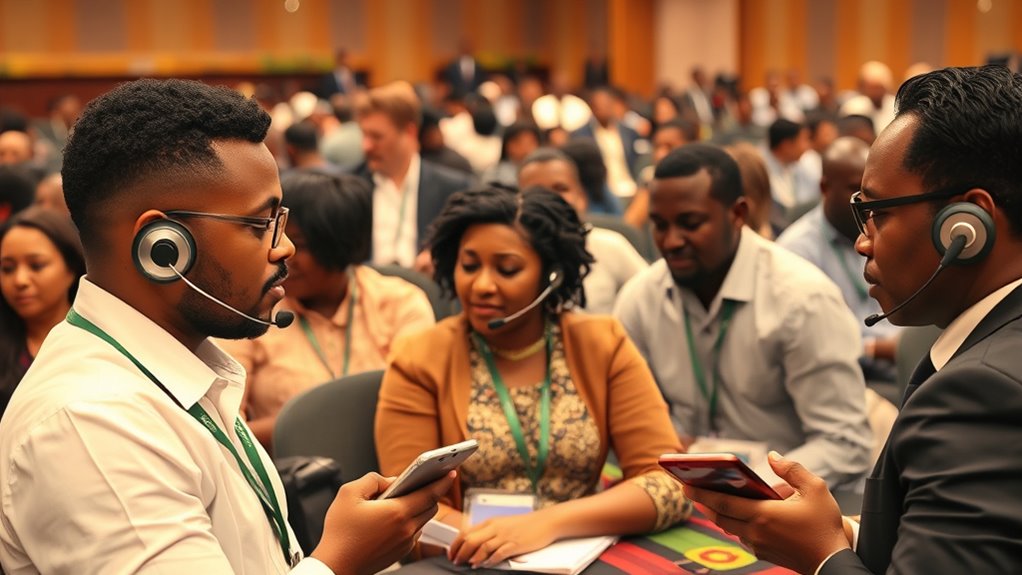Translation services play a crucial role in Ethiopian events, bridging language barriers for diverse audiences across Africa. They support key languages like Amharic, Oromo, and Tigrinya, enhancing communication in business conferences and cultural festivals while promoting inclusivity and cultural exchange. Reliable providers use AI for accurate, real-time translations, ensuring smooth interactions and participant engagement. Exploring options further reveals essential strategies for ideal event planning.
Quick Summaries
- Translation services for Ethiopian events bridge language barriers, fostering inclusivity and effective communication across diverse audiences.
- Common languages like Amharic, Oromo, Tigrinya, and Somali are essential for culturally sensitive translations in regional events.
- These services are vital for business conferences, cultural festivals, and workshops to ensure accurate and engaging interactions.
- Select providers based on expertise in local dialects, reliability, and cultural knowledge to guarantee high-quality event support.
- Technology integration, such as AI-driven real-time translation, enhances accuracy and accessibility for seamless event experiences in Ethiopia.
Benefits of Translation Services for Ethiopian Events

Translation services play an essential role in Ethiopian events by bridging language barriers, enabling effective communication among diverse participants, and fostering inclusivity to guarantee all attendees fully engage and benefit. One key advantage is enhanced participant engagement, as real-time interpretation allows individuals to grasp complex discussions without confusion, leading to more meaningful interactions. This promotes cultural exchange and mutual understanding, enriching the overall experience. Moreover, accurate translations guarantee precise information sharing, reducing errors that could disrupt proceedings and improving event outcomes. By supporting diverse voices, these services boost collaboration and satisfaction, ultimately driving greater success for organizers. In Ethiopia’s multicultural context, they minimize exclusion, fostering an environment where every attendee can contribute effectively and build lasting connections.
Common Languages Required for Events in Ethiopia

Events in Ethiopia often necessitate translation for a variety of key languages due to the country’s linguistic diversity. These include essential tongues commonly used in public gatherings, such as Amharic and Oromo. Understanding the specific languages required helps optimize translation services for effective event communication.
Key Languages Needed
Ethiopia’s linguistic diversity, shaped by its numerous ethnic groups, requires proficiency in several key languages for effective event planning. Amharic, as the official language, serves as a primary medium for national events, facilitating communication across diverse audiences. Oromo, spoken by the largest ethnic group, is essential for events in regions like Oromia, ensuring inclusivity and engagement. Tigrinya plays a vital role in northern areas, particularly for cultural or business gatherings, while Somali supports events in the east to bridge linguistic gaps. Afar and other regional tongues further enhance accessibility, promoting smooth interactions and cultural sensitivity. Event organizers must prioritize these languages to avoid misunderstandings, foster participation, and align with Ethiopia’s multicultural fabric. Professional translation services therefore become indispensable, tailoring content to resonate with attendees and uphold event success.
Common Event Tongues
In Ethiopia’s event landscape, Amharic, Oromo, Tigrinya, and Somali stand out as the most frequently required languages, driven by the country’s ethnic diversity and regional demographics. These tongues facilitate seamless communication at conferences, cultural festivals, and business gatherings, ensuring participants from various regions feel included. For instance, Amharic dominates urban events, while Oromo and Tigrinya are essential in their respective heartlands, and Somali supports border-area activities. Effective translation services bridge linguistic gaps, enhancing engagement and accessibility.
| Language | Primary Event Use Cases |
|---|---|
| Amharic | National conferences |
| Oromo | Cultural festivals |
| Tigrinya | Regional workshops |
| Somali | Community gatherings |
| Afar | Traditional ceremonies |
This approach promotes inclusivity, allowing events to resonate across Ethiopia’s diverse populace.
Types of Events That Need Professional Translation

Various events in Ethiopia rely on professional translation to bridge language barriers effectively. Business conferences, for instance, frequently involve international stakeholders who require precise interpretation for successful discussions. Cultural festivals similarly demand translation services to facilitate participation and understanding among diverse attendees.
Business Conferences
Business conferences in Ethiopia demand professional translation services to guarantee effective communication among participants from diverse linguistic backgrounds, particularly in sectors like trade and investment where multilingual discussions drive outcomes. In these forums, accurate real-time translation bridges language gaps, enabling seamless knowledge exchange and decision-making. For instance, international summits on agriculture or technology often involve stakeholders from Europe, Asia, and Africa, requiring interpreters to convey technical jargon precisely. This guarantees all attendees grasp complex topics, fostering collaborations and investments. Without such services, miscommunications could derail negotiations, hindering Ethiopia’s economic growth. Professional translators also adapt to cultural nuances in business etiquette, enhancing rapport and trust among global partners. Ultimately, these services elevate conference productivity, supporting Ethiopia’s integration into the global market.
Cultural Festivals
Cultural festivals in Ethiopia, such as Timkat and Meskel, require professional translation services to facilitate inclusivity among attendees from varied linguistic groups. These events, featuring elaborate ceremonies and rituals, draw participants from Ethiopia’s eight major languages, including Amharic, Oromiffa, and Tigrinya. Translation guarantees that speeches, performances, and educational content are accessible, preventing miscommunication and enhancing cultural exchange. For instance, real-time interpretation during Timkat’s processions allows international visitors to grasp its religious significance, while translated materials support local diversity. Translation Africa specializes in these services, offering simultaneous interpreting, digital tools, and on-site support to bridge language gaps. This promotes safety, engagement, and a deeper appreciation of Ethiopia’s heritage, making festivals more inclusive and successful. Ultimately, professional translation fosters unity, turning events into platforms for global understanding in Ethiopia’s multilingual society.
How Translation Services Enhance Event Experiences
Translation services play a pivotal role in enriching event experiences in Ethiopia by bridging language barriers and fostering inclusivity among diverse attendees. By providing real-time interpretation, these services guarantee that speakers and participants from various linguistic backgrounds can engage fully, transforming events into dynamic platforms for dialogue. For instance, at conferences or cultural gatherings, accurate translations enhance comprehension, allowing ideas to flow seamlessly and reducing misunderstandings. This inclusivity boosts attendee satisfaction, as individuals feel valued and connected, ultimately elevating the overall atmosphere. In Ethiopia’s multicultural context, such services promote cultural exchange, enabling broader participation and deeper interactions. Moreover, they support professional networking by making information accessible, therefore improving event outcomes and leaving lasting positive impressions on all involved.
Selecting the Right Translation Provider in Africa
Selecting the right translation provider in Africa requires careful consideration of evaluation criteria such as expertise, cost, and cultural knowledge. Provider reliability plays a vital role, encompassing factors like track record, client references, and consistent service quality. Understanding these elements guarantees effective support for events in Ethiopia.
Evaluation Criteria
When evaluating translation providers in Africa, key criteria include expertise in local languages, reliability of service delivery, and cost-effectiveness to guarantee seamless communication for events. Expertise in local languages guarantees translators are fluent and culturally attuned, particularly for Ethiopia’s diverse tongues like Amharic and Oromo, preventing misinterpretations during conferences or cultural gatherings. This involves verifying qualifications and experience in region-specific dialects to maintain accuracy. Cost-effectiveness requires comparing pricing structures against service quality, guaranteeing competitive rates that do not compromise precision or timeliness. Organizers should also assess the provider’s capacity for customization, such as adapting to event scales or formats, while prioritizing clear contractual terms. Ultimately, these factors enable informed choices that enhance event outcomes and participant engagement.
Provider Reliability
Reliability stands as a cornerstone in choosing translation providers for events in Africa, ensuring consistent and accurate services that uphold event integrity. In Ethiopia, where cultural nuances and linguistic diversity are critical, providers must demonstrate proven track records, such as years of experience in event translation and successful case studies. Certifications from bodies like the International Organization for Standardization (ISO) further validate reliability, signaling adherence to quality standards. Clients should evaluate response times, error rates, and client testimonials to gauge dependability. A reliable provider offers contingency plans for unforeseen issues, like last-minute changes, maintaining seamless communication. Ultimately, selecting based on reliability minimizes risks, fostering trust and enhancing the overall success of events across Africa. This approach safeguards against miscommunications that could undermine audience engagement and event outcomes.
Cultural Considerations in Event Translation
Cultural considerations play a pivotal role in event translation, particularly in Ethiopia’s diverse linguistic and ethnic landscape, where subtle nuances in language can alter meanings and audience reception. Effective translation requires sensitivity to cultural contexts, ensuring messages resonate without offense or misunderstanding. In Ethiopia, this involves adapting content to local traditions, idioms, and social norms to foster inclusivity and engagement.
Key aspects include:
- Respecting hierarchical structures: Acknowledging age, status, and authority in communication to maintain harmony.
- Incorporating idiomatic expressions: Translating proverbs and metaphors accurately to preserve cultural essence and intent.
- Addressing gender sensitivities: Adapting language to reflect Ethiopia’s gender dynamics, avoiding stereotypes.
- Honoring ethnic diversity: Tailoring translations for specific groups, like Oromo or Amharic speakers, to enhance relevance and trust.
Technology Integration for Seamless Translations
Technology integration has revolutionized translation services for events in Ethiopia, enabling real-time accuracy and efficiency through tools like AI platforms and mobile applications. These innovations allow interpreters to handle multilingual audiences seamlessly, reducing errors and enhancing engagement. For instance, AI-driven tools process languages in real time, while apps facilitate instant glossary access and collaboration. This guarantees events run smoothly, fostering better communication across diverse groups.
| Technology Tool | Key Benefits |
|---|---|
| AI Platforms | Real-time language processing |
| Mobile Applications | On-the-go translation access |
| Cloud-Based Systems | Secure data sharing |
| Speech Recognition | Accurate voice-to-text |
| Integration APIs | Seamless system connectivity |
Case Studies of Successful Event Translations
Several case studies in Ethiopia highlight the practical application of integrated translation technologies, showcasing how events have achieved precise multilingual communication in diverse settings. For instance, a national conference on agriculture utilized real-time tools to bridge language gaps, resulting in enhanced participant interaction. These examples underscore the transformative impact of such services.
- Improved Accessibility: Events like cultural festivals reached wider audiences by translating content into local languages, fostering inclusivity.
- Enhanced Accuracy: In business summits, AI-driven systems minimized errors, ensuring faithful conveyance of complex ideas.
- Cultural Sensitivity: Workshops on health integrated nuanced translations, preserving context and building trust among attendees.
- Measurable Outcomes: Post-event surveys showed increased satisfaction and knowledge retention, proving the value of tailored multilingual approaches.
Cost Factors for Translation Services in Ethiopia
The cost of translation services in Ethiopia hinges on several key factors, such as project complexity, language pairs, and service provider expertise, which event organizers must evaluate to optimize budgets and guarantee effective communication.
Key factors include project complexity, which escalates with detailed content; language pairs, where less common combinations like Amharic to French increase rates; provider expertise, as certified translators command higher fees; volume of work, offering potential discounts for larger projects; and urgency, which adds rush charges. Additionally, the location and availability of translators in Ethiopia can affect costs, with urban areas like Addis Ababa providing more competitive options. It is essential for event planners to obtain quotes and compare providers.
Below is a table summarizing these cost factors:
| Factor | Description | Impact on Cost |
|---|---|---|
| Project Complexity | Involves intricate content requiring more effort | High |
| Language Pairs | Rarer pairs demand specialized experts | Medium-High |
| Provider Expertise | Certified professionals guarantee quality | Medium |
| Volume of Work | Bulk projects may qualify for discounts | Low-Variable |
| Urgency | Tight deadlines lead to additional fees | High |
Organizers should assess these elements carefully to control expenses effectively.
Legal Aspects of Using Translation in Events
Legal aspects greatly influence the use of translation services in Ethiopian events, encompassing compliance with national laws, contractual obligations, and data protection standards to mitigate risks and guarantee ethical practices. In Ethiopia, event organizers must navigate the Proclamation on Freedom of Information and other regulations to guarantee accurate translations that avoid legal pitfalls. Key considerations include:
- Adhering to the Ethiopian Constitution’s language provisions, which mandate official translations for public events to promote inclusivity and prevent discrimination.
- Securing enforceable contracts with translation providers, detailing scope, fees, and liabilities to protect against breaches.
- Complying with data protection laws, such as the Personal Data Protection Directive, to safeguard sensitive information shared during events.
- Upholding ethical guidelines, including confidentiality and accuracy, to maintain professional integrity and avoid legal disputes.
Tips for Event Planners on Translation Strategies
Event planners must strategically approach translation to guarantee seamless communication in Ethiopia’s diverse linguistic landscape. Effective strategies begin with analyzing audience demographics to identify key languages like Amharic, Oromo, and Somali. Planners should partner with certified translation providers who specialize in event contexts, ensuring interpreters are vetted for accuracy and cultural sensitivity. Utilizing technology, such as simultaneous interpretation systems, enhances real-time delivery without interrupting flow. Prepare translated materials in advance, including scripts and signage, to maintain consistency. Budget carefully by obtaining multiple quotes and accounting for rehearsal time to avoid overruns. Conduct pre-event briefings with translators to align on terminology and context, minimizing errors. Finally, evaluate performance through attendee feedback to refine approaches, promoting inclusivity and engagement.
Emerging Trends in Translation for African Events
Innovations in translation technology are reshaping events across Africa, driven by advancements like AI-powered real-time interpretation and mobile apps that support diverse languages. This evolution enhances accessibility and cultural inclusivity, allowing events to bridge linguistic divides more effectively. As demand grows, key trends include:
- AI-driven automation: Streamlining translation processes to reduce costs and errors, enabling seamless multilingual interactions.
- Mobile accessibility: Apps providing on-the-spot language support, fostering participant engagement in remote or urban settings.
- Cultural localization: Adapting content to reflect regional nuances, ensuring authenticity and deeper audience resonance.
- Hybrid human-AI models: Combining technology with expert linguists for precision in complex events, promoting ethical and accurate communication.
These developments are transforming event experiences across the continent.
Frequently Asked Questions
How Do I Book Translation Services Online?
Booking translation services online generally requires individuals to search for reputable providers via search engines, visit their websites, submit a detailed request form with language needs and event details, review quotes, and complete payment to confirm the booking. This process guarantees efficient arrangements.
What Qualifications Must Translators Have?
Translators must possess qualifications such as fluency in at least two languages, a relevant degree in translation or linguistics, professional certification from recognized bodies, and practical experience to guarantee accurate and culturally sensitive communication.
Do You Provide Post-Event Feedback Reports?
The question pertains to whether post-event feedback reports are provided by translation services. Such reports are often offered to evaluate translation accuracy, gather participant insights, and recommend enhancements for future events, ensuring improved service delivery.
Can Translations Be Customized for Branding?
The question of whether translations can be customized for branding is common in professional settings. Translation services often adapt content to incorporate brand-specific elements, such as terminology and style, ensuring alignment with corporate identity and cultural relevance. This practice enhances overall communication effectiveness.
How Do You Handle Last-Minute Cancellations?
In professional settings, handling last-minute cancellations involves implementing a structured policy: evaluating fees based on notice timing, notifying all parties promptly, rescheduling resources where feasible, and prioritizing minimal disruption to maintain operational continuity.



